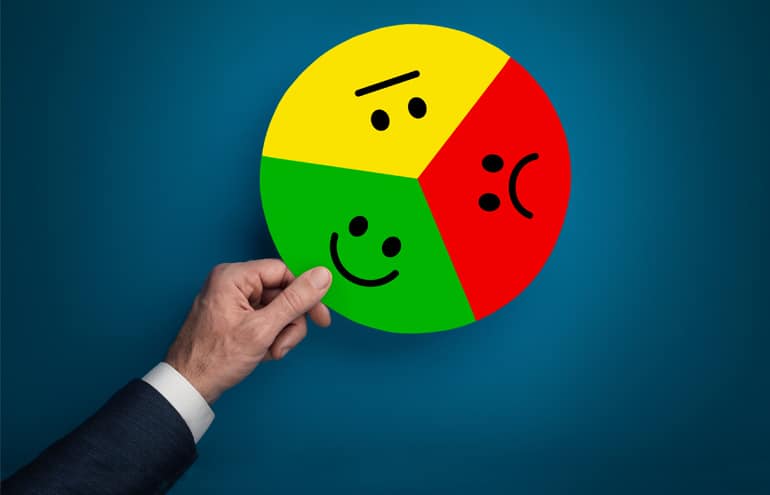Apathy symptoms are defined as a “lack of interest, enthusiasm, or concern.” Here are five tips for how to overcome apathy.

Table of contents
Right now, a lot of people (including me) are struggling with apathy. Apathy is defined as a “lack of interest, enthusiasm, or concern.” Basically, it’s a feeling that we experience as not feeling. It’s an emotion defined by a lack of emotion.
During the pandemic, many of us hadnewfound free time as work has slowed and extracurricular activities are canceled. In “normal” times, we’ve yearned for extra hours to catch up on some long-standing personal to-dos: things like home improvement projects, getting fit, cooking more, spending time on hobbies, and the like. Yet, now that we have the time, we can’t seem to find the energy to do anything on that long list. And we also can’t motivate to do some of the things we “need” to do, or are simply tasked with doing.
“Does any of it really matter?” we ask, with all that’s happening around us.
The answer is yes, but maybe not for the reasons you think.
Life derives its meaningfulness from our engagement with it. When we don’t engage, life is boring to us, and nothing seems to matter. While it may be counterintuitive, the best way to avoid apathy is to re-engage. It’s a wicked circle, though, because how do you engage with enthusiasm when you don’t have any enthusiasm to engage?
Understanding Apathy
Apathy is a mental health condition where you lack interest, motivation and emotional response. It can seep into every area of your life, your daily activities, relationships and work. Apathy is often a symptom of underlying mental health conditions like depression, anxiety or even dementia. It can also be a response to stressful or traumatic events. Understanding apathy is key because it helps you identify the root causes and how to fight it. By recognizing the signs and what triggers those apathetic feelings you can start to get your enthusiasm and zest back.
Apathy Syndrome
Apathy syndrome is a cluster of symptoms that present together, lack of motivation, interest and emotional expression. Diagnosing apathy syndrome can be tricky because it looks different in everyone. A mental health professional will use various assessment tools and techniques to measure apathy and find out what’s underneath. Identifying apathy syndrome is key to making a treatment plan. Work with a mental health professional and you’ll get a better idea of what’s going on and how to fix it, and get back to a more engaged life.
Causes and Risk Factors
Apathy can come from many places, mental health conditions, neurological disorders and traumatic events. Common mental health conditions like depression and anxiety often lead to apathy. Neurological disorders like Alzheimer’s and Parkinson’s can also cause lack of motivation and interest. Traumatic events like abuse or neglect can trigger apathetic feelings. Knowing these causes and risk factors is key to making prevention and treatment plans. By knowing what’s contributing to your apathy you can take targeted action to fix it and improve your overall mental health.
How to Combat Apathy Syndrome: Five Ways to Flip Apathy Into Enthusiasm
Here are five ways to increase your energy and enthusiasm so that apathy becomes interest again!
Apathy is not just a lack of interest; it is a profound absence of motivation and emotional engagement that can affect various aspects of life.
1. Get Some Sleep to Combat Persistent Apathy
When you don’t get sufficient sleep, it can chip away at your happiness and mental health, negatively affecting your energy, motivation and emotions. It can even lead to clinical symptoms of depression and anxiety. The negative side effects of sleep deprivation disrupt your sleep leading to even more negative effects. If you are finding it difficult to fall asleep, make sure you go device-free for at least an hour before bed. And don’t read the news right before bed! Also, avoid caffeine in the afternoon because it can take up to 10 hours for your body to fully rid itself of caffeine. To get back on track, try melatonin or magnesium before bed to help you fall asleep.
Related content: “Start Sleeping Better Tonight: 3 Tips for a More Restful Night”
2. Move Your Body
When you’re apathetic, it can be extremely challenging to motivate you to exercise. Rather than trying to persuade yourself to work out, think instead about ways to move your body. Moving your body, whether it is walking, dancing, playing tag with your kids, or practicing yoga, will increase your sense of well-being. This, in turn, will increase your energy, improve your sleep, relax your body and decrease apathy. The more you move, the more energy and motivation you’ll have, so eventually, you’ll feel ready for more: more movement, more hobbies, more interests. Commit to moving your body for at least 15-30 minutes on most days.
3. Connect With Others
Another effect of apathy is disengagement from others. Oftentimes, apathy makes us feel like we have nothing interesting to say, and nothing we care to know, so we don’t reach out to others. But this a mistake. Getting out of your own head can really help. To climb out of an apathetic attitude, connect with others. Start with people who know you well so you don’t feel the pressure to be “on” or “happy.” Maybe simply watching a movie with your spouse, or reading a book on the couch together with your housemate or child, can make you feel connected through a common interest. You can also connect with others through volunteer opportunities, which are yet another way to focus on a common interest in order to connect. Know someone sewing masks? Reach out to help. Know food banks that want volunteers to drive food to seniors? Give them a call. Do a little research to find an organization near you that needs assistance.
4. Avoid Doom and Gloom and Negative Self Talk
Apathy can make us irritable. While we are quarantined at home with our families or housemates, we may find their habits irritating, even if those same habits didn’t bother us two months ago. Particularly irritating is a housemate who is all “doom and gloom.” As if it wasn’t enough that the world seems to be falling apart and our practices are in limbo, we have a spouse/partner/child/parent/person who is constantly negative and discussing only the worst that is happening in the world! To the extent you can, consider distancing yourself from this person. Ideas include driving further to a different grocery store to have some solitude in the car; taking a long shower; or going for an extended walk. You can also include this person in your anti-apathy activities – maybe it will help mitigate their “doom and gloom.”
5. Try Something New to Overcome Apathy
Sometimes “spicing things up a bit” is a good way to break away from apathy. Since nothing may seem interesting, you might have to force yourself — yes, force yourself — to come up with something to try, and then to actually do it. Many online platforms offer a variety of courses on topics from art, music, dancing, and wine tasting, to writing, business, and academic subjects. You can also find free live classes on Instagram and Facebook, and many recorded programs and classes on YouTube.
Related: “Five Ways to Reduce Anxiety in a Worldwide Pan(dem)ic”
Get Help
If you or a loved one is feeling apathetic get help. A mental health professional can help figure out what’s going on and create a plan for you. Treatment for apathy may be medication, therapy or a combination of both. Cognitive behavioral therapy (CBT) is a common approach to treating apathy, to change negative thought patterns and behaviors. Get help first and it will make all the difference in your journey to feeling good again.
Motivation and Engagement
Motivation and engagement is the key to apathy. Start by setting small goals and breaking them down into smaller tasks. Do things that bring you joy and pleasure. Practice self care and stress management techniques like mindfulness or exercise to reduce apathy and overall well being. Don’t talk to yourself negatively and focus on positive affirmations to build your confidence and drive. With the right strategies and support you can overcome apathy and improve your mental health and well being and make everyday tasks feel manageable and enjoyable.
Whatever you decide to try on any given day, do not delay! If you delay more than a few minutes, you’re likely to talk yourself out of doing it. When you have an idea, try it now.
Here’s to feeling again, and feeling good!
*Statements made on this website have not been evaluated by the U.S. Food and Drug Administration. Any information or products are not intended to diagnose, treat, cure, or prevent any disease. Information provided by this website or this company is not a substitute for individual medical advice.
More From Attorney at Work on Dealing With the COVID-19 Crisis:
- “Handling Fear and Stress During a Prolonged Crisis” by Shawn Healy
- “Continuity of Care: Tips for Reassuring Clients You’re Prepared for the COVID-19 Crisis” by Susan Kostal
- “Offline: The Coronavirus Has Become a Referendum on Remote Work” by Jared Correia
- “The Truth About Remote Working” by Jono Bacon
 Find Your Calm in the Chaos
Find Your Calm in the Chaos
In “The Lawyer, the Lion, and the Laundry: Three Hours to Finding Your Calm in the Chaos,” lawyer and certified health coach Jamie Spannhake helps you learn how to CHOOSE, ACT and THINK in ways that will clarify your desires and set priorities so you can reclaim your time and enjoy your life.
Available in the Attorney at Work bookstore, here.

















